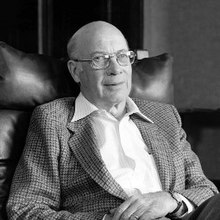Robert Bryce
The Honourable Robert Broughton Bryce | |
|---|---|
 Bryce in 1984 | |
| Clerk of the Privy Council | |
| In office January 1, 1954 – June 30, 1963 | |
| Preceded by | Jack Pickersgill |
| Succeeded by | Robert Gordon Robertson |
| Personal details | |
| Born | February 27, 1910 Toronto, Ontario |
| Died | July 30, 1997 (aged 87) Ottawa, Ontario |
| Profession | Economist, civil servant |
Robert Broughton Bryce, PC CC FRSC, (February 27, 1910 – July 30, 1997) was a Canadian civil servant.
Biography
[edit]After graduating with engineering degree from the University of Toronto, Bryce undertook graduate studies in economics at University of Cambridge, where he was influenced by the ideas of John Maynard Keynes. In the fall of 1935, he left Britain for Harvard University where, as a graduate student, he introduced Keynesian economics in the United States, with the help of fellow Canadian Lorie Tarshis. According to John Kenneth Galbraith, Joseph Schumpeter "called Keynes Allah and Bryce his Prophet".[1]
Bryce started working for the Department of Finance in 1938, later becoming assistant deputy minister of Finance and Secretary to the Treasury Board. In 1954, he became clerk of the Privy Council and Secretary to the Cabinet. He retired in 1968 as deputy minister of Finance.[2]
Works
[edit]He is the author of Maturing in Hard Times: Canada's Department of Finance Through the Great Depression (McGill-Queen's Press, 1986, ISBN 0-7735-0555-5). His other book, Canada and the Cost of World War II: The International Operations of Canada's Department of Finance, 1939-1947 (McGill-Queen's University Press, 2005, ISBN 0-7735-2938-1), edited by Matthew J. Bellamy, was published after his death.
Leading a group of long-serving bureaucrats who gave Canadian government a sense of stability and consistency, Bryce served as secretary to the cabinet and clerk of the Privy Council under Liberal Louis Saint-Laurent and Conservative John Diefenbaker for nine years (1954–1963).[3] This group continued through five administrations, from Mackenzie King to Pierre Trudeau. Bryce was appointed to chair the Royal Commission on Corporate Concentration in May 1975. He resigned due to illness before its completion, and can be considered to be one of the authors of the report.
Honours
[edit]In 1968, he was made a Companion of the Order of Canada "for his services to Canada in various important posts of public administration".[4]
He received honorary Doctor of Laws degrees from the University of Manitoba (1961),[5] the University of Saskatchewan (1970),[6] Mount Allison University (1970)[7] and the University of British Columbia (1980).[8]
References
[edit]- ^ Colander, David; Landreth, Harry (1998), "Political Influence on the Textbook Keynesian Revolution: God, Man, and Laurie (sic) Tarshis at Yale" (PDF), in O. F. Hamouda; B. B. Price (eds.), Keynesianism and the Keynesian Revolution in America: A Memorial Volume in Honour of Lorie Tarshis, Cheltenham: Edward Elgar, pp. 59–72
- ^ "The Honourable Robert Broughton Bryce, Former Clerk of the Privy Council (1954-1963)". Privy Council Office. Archived from the original on 2012-02-18. Retrieved 2009-03-05.
- ^ "Robert Bryce (Obituary) | The Canadian Encyclopedia". www.thecanadianencyclopedia.ca. Retrieved 2023-11-13.
- ^ Office of the Governor General of Canada. Order of Canada citation. Queen's Printer for Canada. Retrieved 24 May 2010
- ^ "Honorary Degree Recipients". University of Manitoba. Retrieved 2009-03-05.
- ^ "Honorary degree recipients". University of Saskatchewan. Retrieved 2009-03-05.
- ^ "Honorary degree Recipients". Mount Allison University. Archived from the original on 2010-12-06. Retrieved 2009-03-05.
- ^ "Honorary Degree Citations". University of British Columbia. Retrieved 2009-03-05.
External links
[edit]- Bothwell, Robert (16 December 2013). "Robert Bryce". The Canadian Encyclopedia (online ed.). Historica Canada.
- Mollins, Carl (15 December 2013). "Robert Bryce (Obituary)". The Canadian Encyclopedia (online ed.). Historica Canada.
- Shoyama, Thomas K. (16 December 2013). "Royal Commission on Corporate Concentration". The Canadian Encyclopedia (online ed.). Historica Canada.
- Robert B. Bryce fonds
- 1910 births
- 1997 deaths
- Canadian non-fiction writers
- Clerks of the Privy Council (Canada)
- Companions of the Order of Canada
- Fellows of the Royal Society of Canada
- Members of the King's Privy Council for Canada
- Keynesians
- 20th-century Canadian economists
- Writers from Toronto
- Canadian federal deputy ministers
- Canadian government biography stubs
